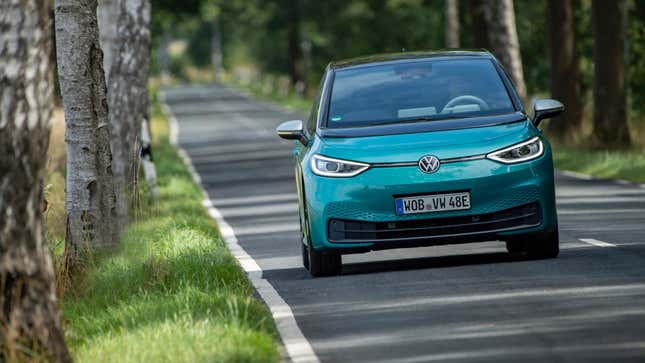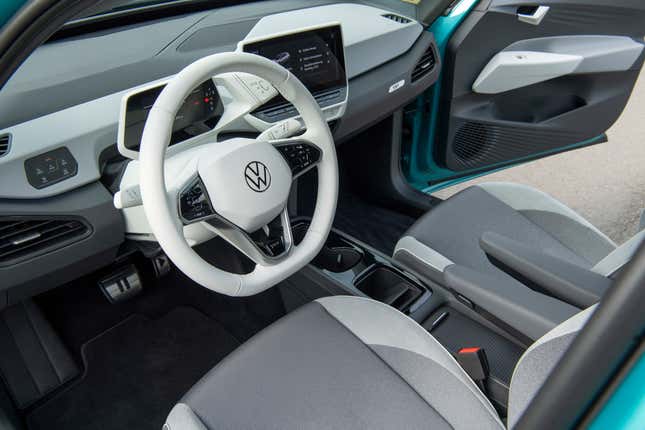
There’s a trend unfolding in the auto industry toward subscription services and pay-as-you-go features. BMW made waves last year when it envisioned a future of “unlocking” heated seats, for example, with a one-time or recurring fee. Now Volkswagen is trying something similar with the new all-electric ID.3.
Volkswagen’s pilot program will be rolled out in six cities in Germany this year, according to Autocar, and it will allow owners to enable certain features on demand, like “travel assist, stop and go, lane assist and ACC,” to give a few examples.
Klaus Zellmer, Volkswagen board member and sales executive, spoke about how the automaker could use this strategy to sell more range to customers who need it:
“Based on the date we get about the customer’s driving profile, we can also approach them and offer them different services. We make offers to customers who then come to us. For example, you have a customer with a battery-powered vehicle, and if we notice he does long journeys, we can provide him with additional range, which we can do digitally.”
At the moment, many brands offer on-demand access to certain features, though their impact has been largely restrained to aspects like navigation or little things, like adaptive headlights. As part of this initiative, Volkswagen will also test pay-by-mile billing, in addition to subscription and one-time billing options.
Proponents of software-locked, on-demand features in cars argue that they’ll allow owners to get exactly what they want, when they want and not when they don’t. Cars with more equipment would theoretically get cheaper, because manufacturers would be making one model with one set of features at a large scale rather than many at different tiers, simplifying production. The theory goes that those savings will be passed along to the consumer, though I’ve heard that before and, uh, I wouldn’t be too sure about that.

Another argued benefit is that it would promote used car buying, and give second or third owners the opportunity to pay to add features to an existing car as they see fit. I’ll concede that sounds genuinely useful.
Indeed, there are practical reasons why this could work, but ultimately spending tens of thousands of dollars on a new car just to be nickel-and-dimed for literally everything and pestered with offers can’t help but seem like a miserable ownership experience.
It’s also more justifiable for some features than others. Companies can typically get away with charging subscription features for software, because there’s already a precedent for that and software tends to be updated over time. It’s easier to rationalize this model for something like Tesla’s Autopilot, as Autopilot is under constant development.
One of the reasons BMW received such scorn when it tried to pull this business with Apple’s CarPlay is because BMW does not develop or maintain CarPlay, so that came across as an especially greedy and disingenuous ploy from the German automaker. Oh, and it also created a scenario where a glitch could break the feature for hundreds of owners at once, while misinformed service representatives wrongly told some folks that they lost CarPlay because they should have been paying a fee that didn’t exist.
To return to the heated seats example, it also feels silly to pay a subscription fee on physical hardware that is manufactured once and never changes, or needs to change, over the lifespan of the vehicle. For every manufacturer’s commitment to leaving as little a carbon footprint as possible, embedding heating elements, additional electric motors and what have you into every vehicle that rolls off your production line seems pretty wasteful when there’s no guarantee it’ll ever be used.
This is all to say that there are scenarios where I think automakers will be able to get away with this, and scenarios where people will be up in arms. And that’s for the best. Yes, subscriptions have become the defining pricing model of our times, but that doesn’t mean they’re necessarily right for every industry, or that people want it. Companies will try to push this as far as it can go; it’ll be on us consumers to draw the line.